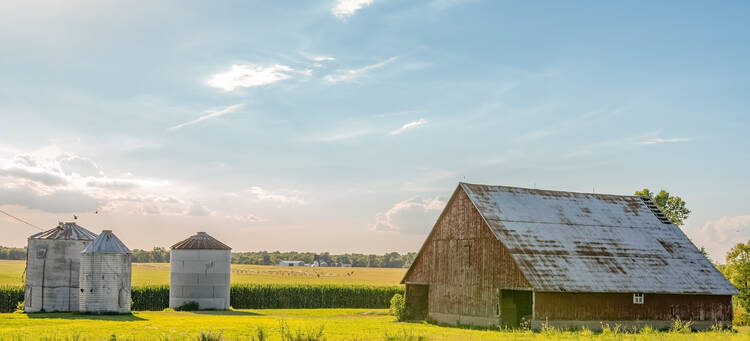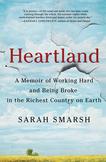Review: Sarah Smarsh on the hard-to-find American Dream
“We can’t really know what made us who we are,” Sarah Smarsh declares early in Heartland: A Memoir of Working Hard and Being Broke in the Richest Country on Earth.“We can come to understand, though, what the world says we are.” Smarsh is an intellectual tornado and Heartland a narrative prairie fire.
As a fifth-generation farm girl growing up in rural Kansas poverty, then, what does Smarsh learn she is, according to the world? She answers by interrogating the corrupt origins of the term “white trash,” (as well as “redneck”, “country” and “flyover country”) finding in its etymology that “the term was first favored by white-supremacist politicians in the South, who aimed to pit poor whites against poor blacks.” She does not learn the term “white working class” until adulthood, or how it “contains both racial privilege and economic disadvantage, which can exist simultaneously.” Nor does Smarsh know as a child that her family is “below the poverty line.” What she does know is myriad: where her dinner’s pork chops come from, when to brace for a tornado, how to ticket the weight of harvested grain.
Sarah Smarsh is an intellectual tornado, and her memoir Heartland is a narrative prairie fire.
“The American narrative of a hard-luck individual working hard, doing the right thing, and finding success for it is so deep in me, my life story so tempting as potential evidence for that narrative’s validity,” Smarsh writes of her own upwardly mobile economic and intellectual trajectory, “that I probably sometimes err on the side of conveying a story in which I’m an individual beating the odds with her own determination.”
Smarsh is, conflictingly, that individual, she acknowledges, but she distinguishes her narrative with an equal acknowledgment of the shape and stakes of those odds. Both she and her brother “were born weeks before an election that Reagan won,” she notes with characteristic political acumen, and her family “would be able to map our lives against the destruction of the working class: the demise of the family farm, the dismantling of public health care, the defunding of public schools, wages so stagnant that full-time workers could no longer pay the bills.” What follows is a riveting excoriation of how government programs and the American Dream function as “two sides of the same trick coin—one promising a good life in exchange for your labor and the other keeping you just alive enough to go on laboring.”
The imperatives of faith also embroil themselves with these slow crises through the inheritance of Smarsh’s Midwestern Catholicism. She notes how her father’s pragmatic “parents were both Catholic and farm people, groups that had different but intertwining reasons for producing a lot of children—the former thinking birth control sinful, the latter needing help raising wheat.” The author is sharply attuned to how Jesus’ loaves and fishes and Joseph’s hammer and nail resonate in her family’s labor: “Before communion, the priest spoke Jesus’s words: ‘This is my body, which will be given up for you.’ It was an idea we understood.”
The cultural tableau Smarsh presents, then, is a prairie whiteness inflected by this Catholicism, as well as economic hardship, rurality, geographic instability and the memoir’s primary conceit: unplanned teen motherhood. Like Ta-Nahesi Coates’ Between the World and Me, Heartland is addressed to its author’s child, but unlike Coates’, Smarsh’s child is permanently imaginary. Instead, she writes to a poor child born of the teen mother she will now never be but so easily could have been. By this narrative flourish, Smarsh opens multiple lenses: into the forces that have conspired with her to elude a cycle of rural poverty, into the stifled rage she has watched nearly all her female relatives endure and into the many ways the American economy consigns young single mothers to poverty. “How can you talk about the poor child without addressing the country that let her be so?” And indeed, how can you address the country without talking about the poor child?
Sarah Smarsh's memoir Heartland is possessed of a fierce feminism, though one enacted by women likely to chafe at that word.
Heartland is also possessed of a fierce feminism, though one enacted by women likely to chafe at that word. The mother, grandmothers and aunts who raise Smarsh embody a kind of “female prairie populism;” for these women, “work wasn’t a liberation from the home or a revelation of self. It was a way of life—familiar, essential, and unsung for generations.” Her grandma Betty, perhaps the book’s most emanating folk heroine, oversees probationers at the county courthouse. Betty recalls the probationers she encountered years later: “They’d say, ‘Thanks for being such a tough bitch.’ ‘My pleasure,’ I’d tell ’em.”
On a sentence level, as above, Heartland is lyrical, homespun, plainspoken and eloquent (which can exist simultaneously); Smarsh is 10 times the poet most writers who set out to produce economic analysis are. Assertions like “Unwed mothers were clever whores who deserved their poverty” convey both how intimate Smarsh is with these classist barbs and the consequent bomb-squad precision she can bring to defusing the dangerous American falsehoods they contain.
Like its author, Heartland resists easy categorization: It is both a farm daughter’s memoir of a troubled and inchoate childhood and an adult scholar’s sophisticated jeremiad on economic inequality in America. It manages both searing honesty about the flawed, human adults who reared Smarsh and unflagging compassion for those people as subjects of systemic dysfunction. It is both an epistle to Smarsh’s unborn daughter and an exposition of how matrescence burdened her forebears. It is both an exhibit of the power of hard work and a silhouette of that power’s limits.
An exegesis of the value, meaning and impact of hard work is at the core of Heartland: “If a person could go to work every day and still not be able to pay the bills and the reason wasn’t racism, what less articulated problem was afoot?” While it would betray the book’s imperatives to canonize Smarsh for wresting economic stability from a system rigged against her, the outcome of the hard work the book itself has clearly entailed—Heartland took Smarsh 15 years to write—remains luminous. Smarsh could have written either a table-flipping philippic on how the economic policy of the last half-century has decimated the American working class or a jaggedly beautiful memoir of a childhood on a Kansas farm. Instead, she wrote Heartland, which is both.
This article also appeared in print, under the headline “Cycles of Poverty,” in the December 10, 2018, issue.











